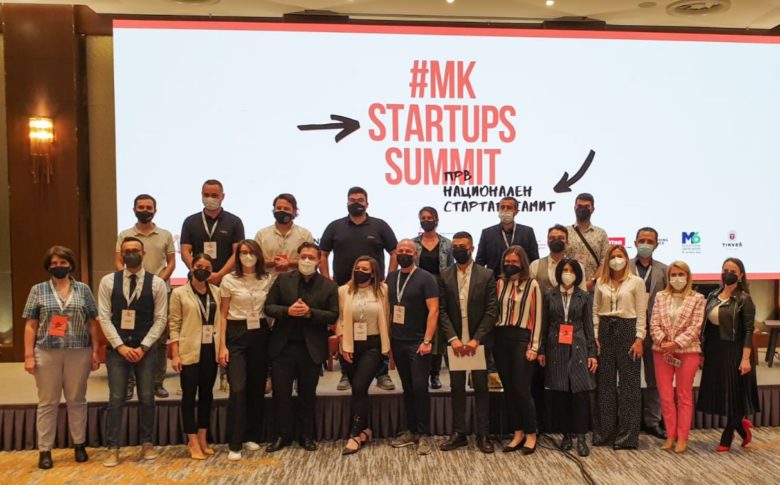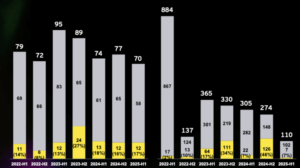First mapping of North Macedonia’s startup ecosystem: bold steps on road to maturing

They talked to over 80 startups and 28 support organiсations and investors – Startup Macedonia, a grassroots umbrella association from North Macedonia, with the support of the Fund for Innovation and Technological Development (FITD), conducted a research to map out the current state of the startup ecosystem in the country. Sales is the number one skill both startups and support organization lack, says the report, titled Connecting Macedonian Startup Ecosystem 2021.
Findings were also discussed as part of the 1st National Startup Summit in North Macedonia, where Sebastian Diaz Mesa, former CEO of Startup Chile, was a key note speaker. “The country is performing better than expected in every way, according to all international ranking. That is because of the people and the talent – FITD, entrepreneurs, startups in the ecosystem,” he noted, emphasising that data availability along with an attractive location are big advantages the country can build upon.
The paper looks into startups, support organisations and funding, highlighting challenges and opportunities where startups and support organisations can improve and thrive through more open and transparent collaboration.
Meet the startups
Startups in North Macedonia are really good at product development, but they lack some essential learning to progress in later stages, as identified by respondents in the report. The majority of startup companies are led by small teams and 90% are working within the country.
One common misconception is that startups are founded by “young people” – an ambiguous term in itself. In reality, data shows that building startups requires not only an entrepreneurial mindset, but also at least some professional skills and experience. Namely, the majority of founders and their teams are either post-graduates or skilled professionals with a few years (or more) of experience under their belt.
Compared to three years ago, where the prototyping stage was in the focus of the ecosystem, more startups are operating in go-to-market and growth stages now. There still seems to exist an impenetrable barrier for most startups to move to later stages, which is due to lack of funding as well as lack of product-market fit.
Another exciting trend is that although startups are still largely interested in the international market, an increasing number are focusing on local and regional markets – which can bring innovation to economies in the region.
Let’s discuss diversity
“In order to have a more inclusive startup ecosystem we should deconstruct the negative stereotypes which lead to exclusion and demonstrate the opposite is true,” says Kalina Trajanoska, Cofounder at Konceptiva Digital.
As startups in North Macedonia often aim at international markets, the discussion needs to shift towards inclusion. One in three startups in the country has a female founder, compared to one in four across Europe. This certainly is progress, but more needs to be done to empower female founders as they are an essential part of the local ecosystem.
“Performance doubles when females lead a business,” said Sebastian Diaz Mesa. More female founders and more diverse teams will only bring better startup culture!
FITD, leader in seed and early stage funding
“If startups become more business-focused, more knowledgeable on how to grow, regardless of the market, they will eventually start bringing revenue. And revenue is a metric for growth, and a metric that investors are familiar with,” the report concluded.
Starting a small business in North Macedonia does not require a sizable capital, compared to the rest of Europe and the world. Most startups are funded through personal savings or bootstrapping, as most founders can afford it – they are either actively working or have already had some experience. Also, founders are becoming more business-focused, developing business management and sales skills.
However, investment-readiness remains low as a direct result of the startups’ lack of knowledge to scale the business and improve revenue over time.
A driving force behind seed and early-stage funding is the Fund for Innovations and Technology Development (FITD). The majority of startups have applied to its funding calls, and most of them have received some funding.
Over 70% of startup companies in North Macedonia need additional financial resources during the phase of business development. At that time, they receive the strongest support from the FITD. And while most startups require funding to help them in these early stages, investors, on the other hand, are more interested in startups with some traction – startups that have shown some potential growth.
The effects of COVID_19
During the pandemic, 40% of startups in North Macedonia had the opportunity to grow and develop their business, while one in three startups reported negative effects. For both startups and support organisations, the pandemic has not been as devastating as feared.
Understandably, the crisis has brought about a shift in industries, bringing healthcare significantly higher on the priority list. Compared to 2016, there is an almost 9% hike in the shareof companies operating in this emerging industry (from 3.1% to 12.0%).
Support organisations are also following the trend – 21.4% of them are currently focusing on the healthcare industry. Other industries in focus include finance, software and marketing and media.
Collaboration improving; more corporate innovation needed
Startups in general are satisfied with the support they are getting from organisations. More importantly, founders are actively participating in those programs – either as participants who want to learn, improve, or connect with others; or as mentors sharing their experiences. There is also a huge improvement in collaboration between startup organisations themselves.
However, one major component is still missing: more collaboration with corporates. There is still a lack of interest or even awareness from corporates and larger enterprises. This is an area that should be improved, as everyone will benefit from better results. Companies can play a significant role and contribute towards developing a better ecosystem, whereas startups can bring innovation and a fresh perspective to all industries.





























